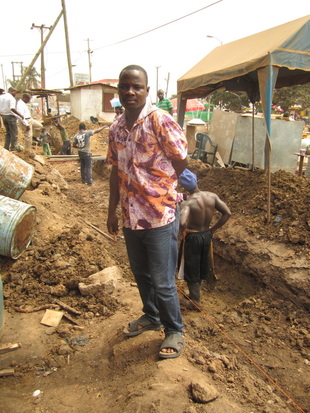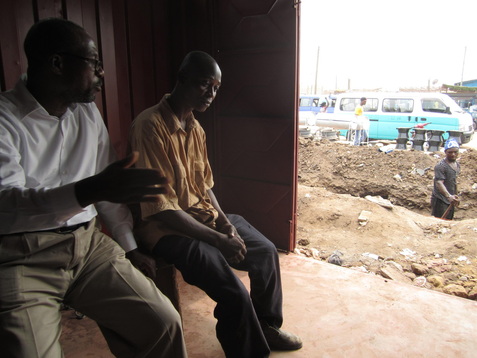Meet Mr. Adolph, Regional Marketing Manager in the Ashanti and Brong-Ahafo regions of Ghana. Based in Kumasi, Adolph has worked with Gyapa Enterprises for a year. He not only leads marketing and sales efforts in the region, looking for ways to bring Gyapa cookstoves into new territories, but he also coordinates 3 ceramicists, 46 metal artisans and 90 retailers. In addition to monitoring this value chain, he also helps manage micro-impact investments Gyapa Enterprises makes into cookstove producing parterns' businesses.
When asked about his favorite part of the job, Adolph replied, "I meet a lot of people and we share a lot of experiences. That has given me a great insight into life."
In his interview (above), Adolph discusses his work with Gyapa Enterprises. He also highlights the loan assistance Gyapa Enterprises has provided a ceramicist in our value chain.
 Gyapa cookstove manufacturer, Labaran Issaka
Gyapa cookstove manufacturer, Labaran Issaka Most people in developed countries take something for granted: rights to the land that they live and work on. But Gyapa cookstove manufacturer, Labaran Issaka, says land rights are a hard thing to come by in the informal sector in Ghana.
Labaran took on the family's metal manufacturing operation in Ashaiman many years ago. His father started the operation in the 1970's on what Labaran describes as "no man's land" outside of Accra and Tema (now one of Ghana's largest port towns).
"The land belonged to the chief, but no one was here. There wasn't even a road," explains Labaran. "People would just find land that was empty and start businesses. It wasn't an issue when my father opened up his business 35 years ago." The Issaka manufacturing business has been running on this land ever since.
But now it is an issue.
Several years ago, the government built a road cutting across part of Labaran's operations. And two years ago, a private citizen began putting up a shopping center on the other side of Labaran's production area. "Labaran's land" was quickly shrinking. But with no rights to the property, there wasn't much he could do.
"Even though my family has been working on this land for more than 30 years, we have no documents to show how long we've been here."
Labaran explained that years ago, chiefs tended to grant people some limited land rights . A sale of the land would take place between the chief and a private citizen or company, and if squatters had been there for years, they were often granted a small portion of that land.
 Gyapa Marketing Manager (left) discusses moving with Labaran's brother
Gyapa Marketing Manager (left) discusses moving with Labaran's brother Not knowing exactly when the land was sold, though, Labaran explains that there's little appeal that can make to the current chief. "Three chiefs have passed since my father started the business here. I can't prove to the current chief that my family has been here, so what can he do? Chiefs a few generations back would have been the ones to grant us part of this land, and that didn't happen. So now we have to go."
The Ghanaian government has recently decided to expand the road that runs next to Labaran's operations. Without much warning, construction workers showed up to begin digging ditches for new pipes and electric wires. "They started on the other side of the road, so at least we knew that they were coming to our side soon," exclaims Labaran.
Labaran's manufacturing group now has construction occurring on both sides of their operating area between the road expansion and the shopping center (which is currently concrete floors and a few walls).
When asked what the timeline was for being evicted from his Ashaiman location, Labaran said "I don't know. They don't give us any warning. They could destroy our manufacturing center at any time. They can decide what they want to do and they don't have to give us a timeline."
With the great relationship that Gyapa Enterprises has formed with Labaran and his cookstove manufacturing group, we've taken on the task of finding land close by so Labaran and his colleagues can move operations quickly. We'll take on the up front rent costs associated with a new location. Gyapa Enterprises will then investigate the possibilities of a centralized production center for Labaran's group and our other manufacturing partners in Accra who are interested in a stable location to work from.
In the meantime, Labaran and his employees continue going to work, not knowing when their facilities will be torn down. It's a difficult way to operate. Without rights to land, Labaran's longtime family business in Ashaiman will soon be a memory.
Indoor air pollution caused by traditional methods of cooking in developing countries can have severe health consequences on households, primarily women and children.
The Global Alliance for Clean Cookstoves explains the problem:
A global market for clean cooking solutions is necessary because 3 billion people still cook with solid fuels each day. When burned in open fires and basic cookstoves, wood, coal, charcoal, and other solid fuels emit a harmful smoke that claims 4 million lives annually through a range of diseases and injuries – making household air pollution from cookstove smoke the fourth greatest health risk in the world
(Read the full article here)


 RSS Feed
RSS Feed
